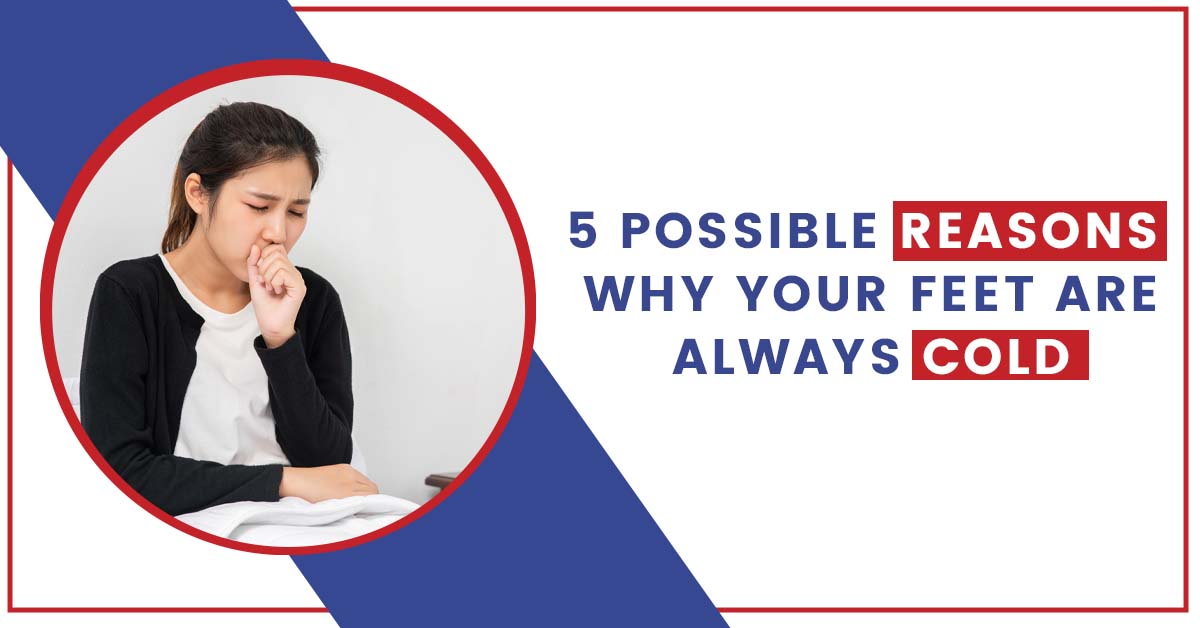A person with cold feet has a lower body temperature than the rest of the body. People living in cooler climates are more likely to experience cold feet. The presence of cold feet can indicate poor circulation. Keeping your feet warm and diagnosing and treating the underlying causes of your cold feet can help treat cold feet.
Cold Feet Symptoms:
There are several signs and symptoms that may indicate a more serious issue, including:
- Despite a warm environment, your hands and/or feet are persistently cold
- A feeling of pain in the hands or feet
- Discoloration of the fingertips and toes, especially on the hands and feet. In some rare cases, this may progress to a black color indicative of tissue death as the hands re-warm. This discoloration can be pale, blue, purple, or red depending on how the hands re-warm.
- A very long healing time or no healing at all for a sore on the hands or feet or changes in the consistency of skin or nails.
- There are certain hours of the day when you experience cold feet, such as during the night.
Why your feet are always cold and what to do About It:
Cold Feet Causes:
Cold feet can be caused by a variety of factors. A lack of warmth can sometimes be the simplest cause. Having bare feet and wearing jeans and a t-shirt makes sense if you’re in jeans and a t-shirt. The problem can also be caused by other factors. Cold feet can be caused by five different factors:
- Poor circulation
There are many causes of cold feet, but this is one of the most common. Your feet can remain cooler than the rest of your body if you have poor circulation, which makes it difficult for enough warm blood to reach them regularly.
A heart condition can cause circulation problems, resulting in the heart struggling to pump blood through the body effectively. A sedentary lifestyle can cause poor circulation because of sitting too much. It is possible to experience this if you sit at a desk all day long for work. It is also possible to have poor circulation when you smoke.
- Anemia
Red blood cells are lacking in anemia, so it occurs when there is a shortage of them. Cold feet are also commonly caused by anemia, particularly in severe cases. Anemia due to iron deficiency can affect even the healthiest of people. The condition can be treated relatively easily by changing your diet and taking supplements.
- Type 1 and type 2 diabetes
The diabetic foot can feel cold to the touch as well as cold to the touch because of nerve damage. A numb or tingling sensation may also be present in the feet. Take extra care to check your feet for cuts or injuries if you experience any symptoms of nerve damage in the feet.
- Buerger’s Disease
The condition is rare, but if you chew tobacco or smoke and your feet are cold, it may be Buerger’s disease. Blood vessels in the hands and feet swell due to the disease, which is linked to tobacco use. As a result, blood flow slows and clots may form which may lead to infection.
Symptoms of Buerger’s disease should be discussed with your doctor. It occurs more often in men than in women, and in people under the age of 45. It is possible to cure Buerger’s disease only by quitting smoking completely.
- Hypothyroidism
Underactive thyroids fail to produce enough thyroid hormone, which causes this condition. The metabolism of the body is disrupted by this. An underactive thyroid could reduce circulation and cause cold feet because metabolism controls both heartbeat and body temperature.
Here are some other causes of cold feet are:
- Plaques narrow the arteries, causing peripheral vascular disease
- Blood vessels spasm as a result of Raynaud’s phenomenon
- Arteriosclerosis
- Nerve damage from other causes
Cold Feet Diagnosis:
It’s important to see a doctor because cold feet can have a wide range of causes. If there are any underlying medical conditions, they will diagnose them and suggest possible treatments.
You will be asked about your symptoms and medical history by your doctor, and you will be examined as well. Depending on the cause of your cold feet, they may run tests to confirm or rule out medical issues.
Cold Feet and Toes Treatment:
As you may have already figured out, your feet may be cold for several reasons. Several of them are associated with underlying health conditions, so you may need a doctor’s help to uncover the cause and receive the appropriate treatment.
It is possible, however, that the doctor will confirm that you have no medical issues to worry about, in which case you can rest assured that you are in good health.
Warming up your cold feet is as easy as following these basic tips and healthy habits:
- Stretch or move your feet: You can warm up your feet by moving around, which will get some blood flowing to them.
- Get some exercise: You can prevent cold feet by exercising regularly, which will improve your circulation.
- Soak them in a warm foot bath: Make a bathtub full of warm water or a large enough vessel and soak your icy feet for a few minutes to warm them up and increase circulation.
- Use a hot water bottle or heating pad: Use a hot water bottle to warm up cold feet and toes or wrap them in a warm pad or blanket.
- Minimize stress: You should reduce your stress wherever you can since stress can cause your extremities to grow cold.
- Wear socks: A pair of socks can warm up and insulate chronically cold feet. What could be better? Add some extra warmth to your day with a luxurious pair of warm socks.
- Cut back on tobacco: A few different blood vessel disorders have been linked to smoking and tobacco use in general. These conditions may be prevented by cutting down on alcohol consumption.


